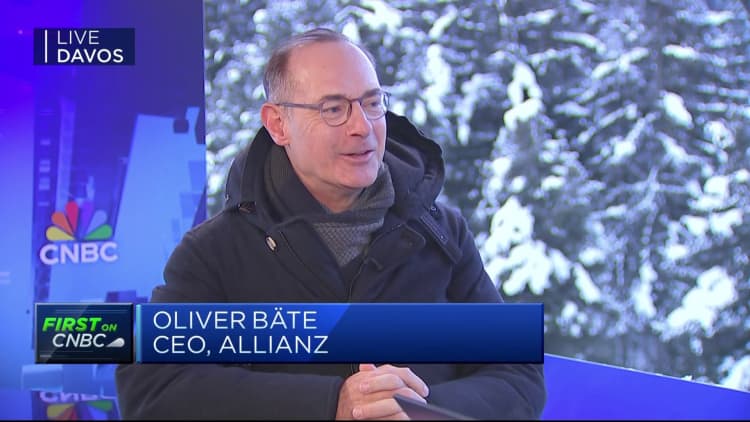Oliver Bäte, chief executive of German insurance group Allianz.
Nurphoto | Nurphoto | Getty Images
A growing detachment between political leaders and populations presents the biggest risk in a busy election year, according to Allianz CEO Oliver Bäte.
Alongside an expanding conflict in the Middle East and Russia’s ongoing war in Ukraine, a plethora of other potential geopolitical flare-ups and a slew of major elections mean that politics is high on the German insurance giant’s risk agenda for 2024.
The Allianz Risk Barometer published this month noted that political risk was already at a five-year high in 2023, with some 100 countries considered at high or extreme risk of civil unrest.
This is expected to deepen in 2024, amid continued economic hardship, particularly in “debt-crisis countries.” Protest groups advocating a range of causes are meanwhile expected to cause greater disruptions.
Asked on the sidelines of the World Economic Forum in Davos, Switzerland, on Tuesday what he considers the main global risk at present, Bäte pointed to a lack of trust from populations in their governments across major democracies.

“You’ve seen recent elections in the Netherlands, you’ve seen it in France, and societies are polarizing because our leaders are not addressing the needs of the people,” he said.
Last year, mass protests took place in France against President Emmanuel Macron’s pension reforms and the killing of teenager Nahel Merzouk by a police officer, resulting in intense violence and property damage.
The Allianz Risk Barometer report also noted that populist and far-right political forces expanded their influence with electoral success in the Netherlands and Slovakia, reinforcing the emerging trend that started in 2022, when “Italy elected a party with neo-fascist roots, Hungary re-elected Viktor Orbán, and the far-right Sweden Democrats took over 20% of the votes in a general election.”
“We have an increasing detachment of the political elite from the working class and the people that actually go to work every day, and that, I see as the number one risk for our societies,” Bäte said.

“And remember, this year a lot of people are going to vote, so we need to make sure that they vote for the right things and are not just venting anger.”
Alongside the risks surrounding elections in Europe and the U.S., multiple African countries have also erupted into conflict or unrest in recent years, with successful coups occurring in Niger and Gabon in 2023 following the September 2022 regime change in Burkina Faso.
“While these coups have been relatively peaceful, Sudan is rapidly escalating into civil war, mainly in its capital Khartoum,” Srdjan Todorovic, head of political violence and hostile environment solutions at Allianz Commercial, said in the Allianz Risk Barometer report.
“Economic difficulties are challenging many countries, in particular Tunisia, which teetered on the edge of violence as President [Kais] Saied continued to rule through decree and without a Parliament.”

